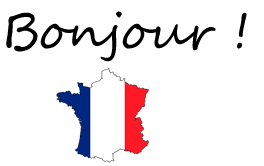Language/French/Vocabulary/How-to-say-Hello
If you need to learn the basics of the French language, start with simple common phrases and master these first. Once you master the simple phrases like "hello" in French, then you can move on to more complicated communication. In this lesson, we will focus on French Greetings to say "Hello" in French. 🇫🇷
After mastering the art of saying "hello" in French, you might want to explore other aspects of the language. For instance, you can dive into the world of French beverages and drinking habits or even learn how to express your feelings with French vocabulary about love. These additional resources will help you expand your knowledge and become more confident in your French language skills. Bonne chance!
1. Bonjour[edit | edit source]
It means "hello" or "good morning". Be careful with spelling: Bonjour is written together and never separated. This works for both formal and informal setting. It’s probably the first word that most French language beginners learn. Not using it is deemed impolite. Once the sun sets, you'll have to say bonsoir! (Good evening!)
2. Salut ![edit | edit source]
It means "hi!" or good morning. It is used to say hello in an informal setting. Do not use it if you are in a work environment, or with strangers, etc. Note that the ‘t’ on the end is not pronounced. It follows the general rule : "if a final consonant is not followed by an ‘e’ or other vowel, it is not pronounced".
3. Hey ! Quoi de neuf ?[edit | edit source]
This literally means ‘Hi ! What’s new?’ and is an excellent greeting to use with a friend you haven’t seen for a long time and to start a conversation.
4. Coucou ![edit | edit source]
It means "Hey there!" This is a very informal way of greeting someone. It's reserved for close friends or family because there is a rather playful and familiar tone behind this word.
5.Wesh (mec) ![edit | edit source]
Used meanly by boys from the suburbs of Paris (mec means boy). It comes from Arabic. ⚠ It is very familar.
6.Bonsoir[edit | edit source]
Bonsoir means "good evening". Use it from 17 h or so. You must write it in one word. Never write "Bon soir".
Formal or Informal conversations[edit | edit source]
In general the word "Bonjour" can be applied to any type of conversation, whether formal or informal.
Formal conversations[edit | edit source]
For formal talks:
- Bonjour Monsieur ! (Good morning, Sir)
- Bonjour Madame ! (Good morning, Madam)
- Comment allez-vous ? (How do you do?)
- Très bien, merci et vous ? (Fine, thank you and you?)
If they are already more than 7:00 pm, in French "Bonjour" is replaced by "Bonsoir" (Good evening) and finally, to wish Good night, say "Bonne nuit".
Informal conversations[edit | edit source]
For informal conversations (with friends, family, etc.):
- Salut ! (Hi!)
- Comment vas-tu ? (How are you?)
- Comment ça va ? (How are you?)
- Très bien, merci, et toi ? (Very well thank you, and you?)
- Au revoir ! (Bye!)
- À bientôt ! (See you soon!)
- À plus tard (See you later)
- À demain (See you tomorrow)
If you consider that this page can be improved, don't hesitate to edit it.
VIDEOS[edit | edit source]
Other Lessons[edit | edit source]
- Animal
- Fruits Berries and Nuts
- Election
- Days of the Week
- French words of Arabic origin
- How to Say Good Bye
- Difference between Ancre and Encre
- Martial Arts
- Numbers
- Le corps humain

